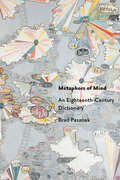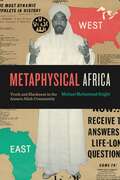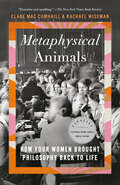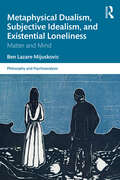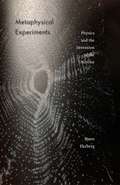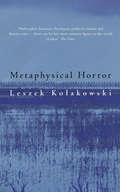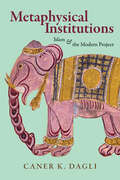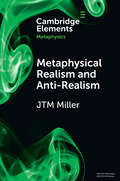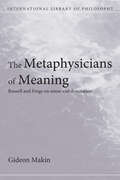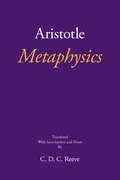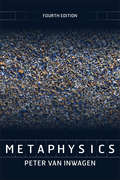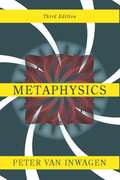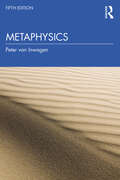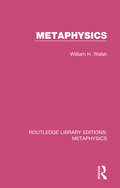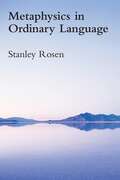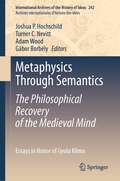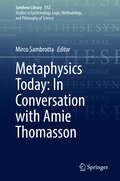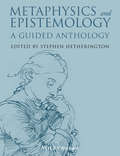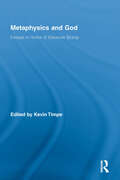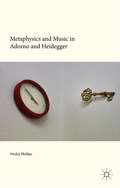- Table View
- List View
Metaphors of Mind: An Eighteenth-Century Dictionary
by Brad PasanekA pathbreaking introduction to eighteenth-century metaphors of the mind that recasts the grand narrative of the Enlightenment in terms of its tropes and figures.An encyclopedic dictionary along the lines of Voltaire’s classic Dictionnaire Philosophique, Metaphors of Mind provides an in-depth look at the myriad ways in which Enlightenment writers used figures of speech to characterize the mind. Drawn from Brad Pasanek’s massive online archive, http://metaphorized.net, this volume constitutes a veritable treasury of mental metaphorics.Dividing the book into eleven broad metaphorical categories—Animals, Coinage, Court, Empire, Fetters, Impressions, Inhabitants, Metal, Mirror, Rooms, and Writing—Pasanek maps out constellations of metaphors. He frames his collection of literary excerpts in each section with a more descriptive and theoretical discussion of what he calls "desultory reading," a form of unsystematic perusal of writing frequently employed by Enlightenment thinkers. By surveying the printed past alongside the digital present, the book treats eighteenth-century writing as its topic while essentially exemplifying its rhetorical approach.More than an exercise in quotation, this intellectual history offers illuminating readings of fragmentary literary works and confrontations with neoclassical and contemporary theories of metaphor. The book’s entries complicate received ideas about Locke’s blank slate, question M. H. Abrams’ claims about mirrors and lamps, and chart changing frequencies of metal metaphors in a moment of industrial revolution. The book also responds to current anxieties about reading and the mass digitization of literature, touching on recent discussions of "distant reading," "shallow reading," and "surface reading." Promoting critical and creative anachronism, Metaphors of Mind redefines the notion of an archive in the age of Amazon and Google Books.
Metaphysical Africa: Truth and Blackness in the Ansaru Allah Community (Africana Religions #4)
by Michael Muhammad KnightThe Ansaru Allah Community, also known as the Nubian Islamic Hebrews (AAC/NIH) and later the Nuwaubians, is a deeply significant and controversial African American Muslim movement. Founded in Brooklyn in the 1960s, it spread through the prolific production and dissemination of literature and lecture tapes and became famous for continuously reinventing its belief system. In this book, Michael Muhammad Knight studies the development of AAC/NIH discourse over a period of thirty years, tracing a surprising consistency behind a facade of serial reinvention.It is popularly believed that the AAC/NIH community abandoned Islam for Black Israelite religion, UFO religion, and Egyptosophy. However, Knight sees coherence in AAC/NIH media, explaining how, in reality, the community taught that the Prophet Muhammad was a Hebrew who adhered to Israelite law; Muhammad’s heavenly ascension took place on a spaceship; and Abraham enlisted the help of a pharaonic regime to genetically engineer pigs as food for white people. Against narratives that treat the AAC/NIH community as a postmodernist deconstruction of religious categories, Knight demonstrates that AAC/NIH discourse is most productively framed within a broader African American metaphysical history in which boundaries between traditions remain quite permeable.Unexpected and engrossing, Metaphysical Africa brings to light points of intersection between communities and traditions often regarded as separate and distinct. In doing so, it helps move the field of religious studies beyond conventional categories of "orthodoxy" and "heterodoxy," challenging assumptions that inform not only the study of this particular religious community but also the field at large.
Metaphysical Africa: Truth and Blackness in the Ansaru Allah Community (Africana Religions)
by Michael Muhammad KnightThe Ansaru Allah Community, also known as the Nubian Islamic Hebrews (AAC/NIH) and later the Nuwaubians, is a deeply significant and controversial African American Muslim movement. Founded in Brooklyn in the 1960s, it spread through the prolific production and dissemination of literature and lecture tapes and became famous for continuously reinventing its belief system. In this book, Michael Muhammad Knight studies the development of AAC/NIH discourse over a period of thirty years, tracing a surprising consistency behind a facade of serial reinvention.It is popularly believed that the AAC/NIH community abandoned Islam for Black Israelite religion, UFO religion, and Egyptosophy. However, Knight sees coherence in AAC/NIH media, explaining how, in reality, the community taught that the Prophet Muhammad was a Hebrew who adhered to Israelite law; Muhammad’s heavenly ascension took place on a spaceship; and Abraham enlisted the help of a pharaonic regime to genetically engineer pigs as food for white people. Against narratives that treat the AAC/NIH community as a postmodernist deconstruction of religious categories, Knight demonstrates that AAC/NIH discourse is most productively framed within a broader African American metaphysical history in which boundaries between traditions remain quite permeable.Unexpected and engrossing, Metaphysical Africa brings to light points of intersection between communities and traditions often regarded as separate and distinct. In doing so, it helps move the field of religious studies beyond conventional categories of “orthodoxy” and “heterodoxy,” challenging assumptions that inform not only the study of this particular religious community but also the field at large.
Metaphysical Animals: How Four Women Brought Philosophy Back to Life
by Rachael Wiseman Clare Mac CumhaillA NEW YORK TIMES BOOK REVIEW BEST BOOK OF THE YEAR • A vibrant portrait of four college friends—Iris Murdoch, Philippa Foot, Elizabeth Anscombe, and Mary Midgley—who formed a new philosophical tradition while Oxford's men were away fighting World War II.The history of European philosophy is usually constructed from the work of men. In Metaphysical Animals, a pioneering group biography, Clare Mac Cumhaill and Rachael Wiseman offer a compelling alternative. In the mid-twentieth century Elizabeth Anscombe, Mary Midgley, Philippa Foot, and Iris Murdoch were philosophy students at Oxford when most male undergraduates and many tutors were conscripted away to fight in the Second World War. Together, these young women, all friends, developed a philosophy that could respond to the war&’s darkest revelations.Neither the great Enlightenment thinkers of the past, the logical innovators of the early twentieth century, or the new Existentialist philosophy trickling across the Channel, could make sense of this new human reality of limitless depravity and destructive power, the women felt. Their answer was to bring philosophy back to life. We are metaphysical animals, they realized, creatures that can question their very being. Who am I? What is freedom? What is human goodness? The answers we give, they believed, shape what we will become.Written with expertise and flair, Metaphysical Animals is a lively portrait of women who shared ideas, but also apartments, clothes and even lovers. Mac Cumhaill and Wiseman show how from the disorder and despair of the war, four brilliant friends created a way of ethical thinking that is there for us today.
Metaphysical Dualism, Subjective Idealism, and Existential Loneliness: Matter and Mind (Philosophy and Psychoanalysis)
by Ben Lazare MijuskovicSince the ages of the Old Testament, the Homeric myths, the tragedies of Sophocles and the ensuing theological speculations of the Christian millennium, the theme of loneliness has dominated and haunted the Western world. In this wide-ranging book, philosopher Ben Lazare Mijuskovic returns us to our rich philosophical past on the nature of consciousness, lived experience, and the pining for a meaningful existence that contemporary social science has displaced in its tendency toward material reduction. Engaging key metaphysical discussions on causality, space, time, subjectivity, the mind body problem, personal identity, freedom, religion, and transcendence in ancient, scholastic, modern, and contemporary philosophy, he highlights the phenomenology of loneliness that lies at the very core of being human. In challenging psychoanalytic and neuroscientific paradigms, Mijuskovic argues that isolative existence and self-consciousness is not so much of a problem of unconscious conflict or the need for psychopharmacology as it is the loss of a sense of personal intimacy. The issue of the criteria of "personal identity" in relation to loneliness has long engaged and consumed the interest of theologians, ethicists, philosophers, novelists and psychologists. This book will be of great interest to academics and students of the humanities, and all those with an interest in the philosophy of loneliness.
Metaphysical Experiments: Physics and the Invention of the Universe (Posthumanities #49)
by Bjørn EkebergAn engaging critique of the science and metaphysics behind our understanding of the universe The James Webb Space Telescope, when launched in 2021, will be the premier orbital observatory, capable of studying every phase of the history of the universe, from the afterglow of the Big Bang to the formation of our solar system. Examining the theoretical basis for key experiments that have made this latest venture in astrophysics possible, Bjørn Ekeberg reveals that scientific cosmology actually operates in a twilight zone between the physical and metaphysical. Metaphysical Experiments explains how our current framework for understanding the universe, the Big Bang theory, is more determined by a deep faith in mathematical universality than empirical observation. Ekeberg draws on philosophical insights by Spinoza, Bergson, Heidegger, and Arendt; on the critical perspectives of Latour, Stengers, and Serres; and on cutting-edge physics research at the Large Hadron Collider, to show how the universe of modern physics was invented to reconcile a Christian metaphysical premise with a claim to the theoretical unification of nature.By focusing on the nonmathematical assumptions underlying some of the most significant events in modern science, Metaphysical Experiments offers a critical history of contemporary physics that demystifies such concepts as the universe, particles, singularity, gravity, blackbody radiation, the speed of light, wave/particle duality, natural constants, black holes, dark matter, and dark energy. Ekeberg&’s incisive reading of the metaphysical underpinnings of scientific cosmology offers an innovative account of how we understand our place in the universe.
Metaphysical Grounding
by Fabrice Correia Benjamin SchniederSome of the most eminent and enduring philosophical questions concern matters of priority: what is prior to what? What 'grounds' what? Is, for instance, matter prior to mind? Recently, a vivid debate has arisen about how such questions have to be understood. Can the relevant notion or notions of priority be spelled out? And how do they relate to other metaphysical notions, such as modality, truth-making or essence? This volume of new essays, by leading figures in contemporary metaphysics, is the first to address and investigate the metaphysical idea that certain facts are grounded in other facts. An introduction introduces and surveys the debate, examining its history as well as its central systematic aspects. The volume will be of wide interest to students and scholars of metaphysics.
Metaphysical Horror
by Leszek Kolakowski Agnieszka KolakowskaFor over a century, philosophers have argued that philosophy is impossible useless, or both. Although the basic notion dates back to the days of Socrates, there is still heated disagreement about the nature of truth, reality, knowledge, the good, and God. This may make little practical difference to our lives, but it leaves us with a feeling of radical uncertainty, a feeling described by Kolakowski as "metaphysical horror." "The horror is this," he says, "if nothing truly exists except the Absolute, the Absolute is nothing; if nothing truly exists except me, I am nothing." <p><p>The aim of this book, for Kolakowski, is finding a way out of this seeming dead end. In a trenchant analysis that serves as an introduction to nearly all of Western philosophy, Kolakowski confronts these dilemmas head-on through examinations of several prominent philosophers including Descartes, Spinoza, Husserl, and many of the Neo-Platonists. He finds that philosophy may not provide definitive answers to the fundamental questions, yet the quest itself transforms our lives. It may undermine most of our certainties, yet it still leaves room for our spiritual yearnings and religious beliefs. <p><p>The final sentence of the book captures the hopefulness that has survived the horror of nothingness when Kolakowski asks: "Is it not reasonable to suspect that if existence were pointless and the universe devoid of meaning, we would never have achieved not only the ability to imagine otherwise, but even the ability to entertain this very thought--to wit, that existence is pointless and the universe devoid of meaning?" The answer, of course, is clear. Now it is up to readers to take up the challenge of his arguments.
Metaphysical Institutions: Islam and the Modern Project (SUNY series in Islam)
by Caner K. DagliIn Metaphysical Institutions, Caner K. Dagli explores the ultimate nature of the realities we call religions, cultures, civilizations, and traditions through the lens of a particular question often limited to religious studies, history, and anthropology, namely: "What is Islam?" The book is both a philosophical treatise about the nature of shared thinking that uses the encounter between the Modern Project and Islam as an illustrative example, and an exploration of the conceptualization of Islam in light of the metaphysics of consciousness and meaning.Dagli first develops a comprehensive theory of the institution and then expands its meaning to include a new category called "metaphysical institutions," with the goal of establishing both necessary and empirically variable features of all institutions, including those that deal with ultimate questions. The new model is then used to analyze questions of authority and autonomy, rationality and imitation, the universal and the particular, and other enduring questions.
Metaphysical Realism and Anti-Realism (Elements in Metaphysics)
by J. T. MillerMinimally, metaphysical realists hold that there exist some mind-independent entities. Metaphysical realists also (tend to) hold that we can speak meaningfully or truthfully about mind-independent entities. Those who reject metaphysical realism deny one or more of these commitments. This Element aims to introduce the reader to the core commitments of metaphysical realism and to illustrate how these commitments have changed over time by surveying some of the main families of views that realism has been contrasted with: such as (radical) scepticism, idealism, and anti-realism.
Metaphysicians of Meaning: Frege and Russell on Sense and Denotation (International Library of Philosophy)
by Gideon MakinRussell's On Denoting and Frege's On Sense and Reference are now widely held to be two of the founding papers of twentieth century philosophy and form the heart of the famous "linguistic turn". The Metaphysicians of Meaning is the first book to challenge the accepted secondary work on these two seminal papers, forcing us to reconsider the interpretation of these two vitally important works on meaning.
Metaphysics
by Aristotle C. D. ReeveThis new translation of Aristotle's Metaphysics in its entirety is a model of accuracy and consistency, presented with a wealth of annotation and commentary. Sequentially numbered endnotes provide the information most needed at each juncture, while a detailed Index of Terms guides the reader to places where focused discussion of key notions occurs. An illuminating general Introduction describes the book that lies ahead, explaining what it is about, what it is trying to do, how it goes about doing it, and what sort of audience it presupposes.
Metaphysics
by Peter Van InwagenWith thoughtful and engaging prose, noted scholar Peter van Inwagen provides a comprehensive introduction to metaphysics in this essential text. Metaphysics covers the gamut of historical and contemporary arguments of metaphysics, engaging readers through three profound questions: What are the most general features of the world? Why is there a world? And, what is the place of human beings in the world? The thoroughly revised fourth edition includes an updated and rewritten chapter on temporality and significant improvements to the clarity and accessibility of the language, making it an even more valuable text for undergraduate students. Metaphysics remains the quintessential book in this field of study, and a fascinating book for a wide range of readers, from those new to the subject to the most sophisticated philosophers.
Metaphysics
by Peter Van InwagenA clearly and accessibly written introduction to metaphysics for readers with little or no background in philosophy, this brief book covers the Western philosophical tradition, introducing both historical and contemporary arguments.
Metaphysics
by Peter Van InwagenThis essential core text introduces readers to metaphysics. In thoughtful and engaging prose, Peter van Inwagen examines three profound questions: What are the most general features of the world? Why is there a world? And, what is the place of human beings in the world? <P><P>The third edition includes an entirely new chapter on ontology. The new chapter presents a theory of the nature of being and proceeds to apply this theory to two problems of ontology: the problem of non-existent objects and the problem of universals. <P>Equally valuable as a textbook in a university course or an introduction to metaphysical thinking for the interested layperson, Metaphysics remains a fascinating book for a wide range of readers, from first-time students to the most sophisticated philosophers.
Metaphysics
by Peter Van InwagenWith thoughtful and engaging prose, noted scholar Peter van Inwagen provides a comprehensive introduction to metaphysics in this essential text. Metaphysics covers the gamut of historical and contemporary arguments of metaphysics, engaging readers through three profound questions: What are the most general features of the world? Why is there a world? And, what is the place of human beings in the world? The thoroughly revised fourth edition includes an updated and rewritten chapter on temporality and significant improvements to the clarity and accessibility of the language, making it an even more valuable text for undergraduate students. Metaphysics remains the quintessential book in this field of study, and a fascinating book for a wide range of readers, from those new to the subject to the most sophisticated philosophers.
Metaphysics
by Peter van InwagenThis book is an introduction to metaphysics. It presupposes no previous acquaintance with philosophy, and addresses the following questions: What is metaphysics? Is there a plurality of things, or is there only one thing? Is there an external world, a world of things that exist independently of human thought and sensation? What is time? Is there such a thing as objective truth? Why is there something rather than nothing? Does our existence have a meaning? Are we physical or non-physical beings? Do we have free will? Are there things that do not exist? Do universals exist? This Fifth Edition differs from the Fourth in that the long, previously difficult chapter on time has been extensively rewritten, making it much more accessible and engaging for the student reader. In addition, the author has enhanced clarity throughout the text with improvements to word choice, sentence structure, and paragraph lucidity. Finally, the Notes and Suggestions for Further Reading at the end of each chapter and the General Bibliography have all been brought up to date. Key Features: Presupposes no prior acquaintance with philosophy, making the book ideal for the undergraduate student or interested general reader Offers 13 chapters, organized into three parts and each with its own introduction: I. The Way the World Is II. Why the World Is III. The Inhabitants of the World Incorporates extensive revisions to Chapter 4 on temporality Includes updates to the Chapter Notes and Suggestions for Further Reading as well as to the General Bibliography
Metaphysics (Routledge Library Editions: Metaphysics #8)
by William H. WalshOriginally published in 1963. An outline of the metaphysical positions held by such major philosophers as Plato, Aristotle, Descartes, Hegel, Kant, Hume, Moore, Bradley, Wittgenstein. The author maintains – controversially – that metaphysical arguments have a close bearing on religious and moral beliefs.
Metaphysics In Ordinary Language
by Stanley RosenIn this rich collection of philosophical writings, Stanley Rosen addresses a wide range of topics -from eros, poetry, and freedom to problems like negation and the epistemological status of sense perception. Though diverse in subject, Rosen's essays share two unifying principles: there can be no legitimate separation of textual hermeneutics from philosophical analysis, and philosophical investigation must be oriented in terms of everyday language and experience, although it cannot simply remain within these confines. Ordinary experience provides a minimal criterion for the assessment of extraordinary discourses, Rosen argues, and without such a criterion we would have no basis for evaluating conflicting discourses: philosophy would give way to poetry. Philosophical problems are not so deeply embedded in a specific historical context that they cannot be restated in terms as valid for us today as they were for those who formulated them, the author maintains. Rosen shows that the history of philosophy -- a story of conflicting interpretations of human life and the structure of intelligibility -- is a story that comes to life only when it is rethought in terms of the philosophical problems of our own personal and historical situation.
Metaphysics Through Semantics: Essays in Honor of Gyula Klima (International Archives of the History of Ideas Archives internationales d'histoire des idées #242)
by Joshua P. Hochschild Turner C. Nevitt Adam Wood Gábor Borbély“More than any other living scholar of medieval philosophy, Gyula Klima has influenced the way we read and understand philosophical texts by showing how the questions they ask can be placed in a modern context without loss or distortion. The key to his approach is a respect for medieval authors coupled with a commitment to regarding their texts as a genuine source of insight on questions in metaphysics, theology, psychology, logic, and the philosophy of language—as opposed to assimilating what they say to modern doctrines, or using medieval discussions as a foil for ‘new and improved’ conceptual schemes.” Jack Zupko, University of Alberta“Gyula Klima is widely recognized as one of the world’s leading experts on thirteenth and fourteenth-century Latin philosophy, with his own, distinctive analytic approach, which brings out both the similarities and differences between medieval and contemporary logic and semantics.” John Marenbon, Trinity College, University of Cambridge “Gyula Klima has been a towering figure in the field of medieval philosophy for decades. His influence comprises not only the scholarly results of his work, but also intense and generous mentorship of students and junior colleagues. This volume is a perfect reflection of the esteem that he enjoys around the world, collecting excellent pieces by established as well as up-and-coming scholars of medieval philosophy.” Catarina Dutilh Novaes, Vrije Universiteit Amsterdam“For four decades now, Gyula Klima has been setting the standard among medievalists for philosophical sophistication and historical rigor. This collection of wide-ranging studies from leading scholars in the field offers a worthy tribute to that legacy.” Robert Pasnau, University of Colorado BoulderGyula Klima is Professor of Philosophy at Fordham University, and Senior Research Fellow, Consultant, and the Director of Institute for the History of Ideas of the Hungarian Research Institute in Budapest. In 2022, the President of Hungary awarded him the Knight’s Cross of the Hungarian Order of Merit, “in recognition of his outstanding academic career, significant research work and exemplary leadership.” In this volume, colleagues, collaborators, and students celebrate Klima’s project with new essays on Plotinus, Anselm, Aquinas, Buridan, Ockham and others, exploring specific questions in philosophy of mind, philosophy of language, metaphysics, and logic.No contemporary surpasses Kripke and Klima in semantics and metaphysics, but only Gyula Klima’s thought ranges flawlessly over classical philosophy as well. The volume is a fitting tribute to the master. David Twetten, Marquette University
Metaphysics Today: In Conversation with Amie Thomasson (Synthese Library #512)
by Mirco SambrottaThis book offers an insight into some of the central topics in the current panorama of metaphysics. Thorny issues, such as the ontological state of fictional entities, abstract objects, and possible and impossible worlds, are addressed through an open conversation with Amie Thomasson, one of the leading figures in the current scene and landscape of metaphysics. This collection of heterogeneous and critical essays on her work, and her replies to them, stem from the SIUCC (Seminario Interuniversitario de Ciencia Cognitiva/Inter-University 3-day Workshop on Philosophy and Cognitive Science). By means of this interaction between a group of top scholars and Amie Thomasson, the book introduces the philosophically curious to the way the "first philosophy" is carried out today. This volume is of great interest to academics, philosophy majors who are taking an upper-division metaphysics class, and members of the general public who are curious about the work of Amie Thomasson.
Metaphysics and Epistemology: A Guided Anthology (Blackwell Philosophy Anthologies #20)
by Stephen HetheringtonMetaphysics and Epistemology: A Guided Anthology presents a comprehensive introductory overview of key themes, thinkers, and texts in metaphysics and epistemology. Presents a wide-ranging collection of carefully excerpted readings on metaphysics and epistemology Blends classic and contemporary works to reveal the historical development and present directions in the fields of metaphysics and epistemology Provides succinct, insightful commentary to introduce the essence of each selection at the beginning of chapters which also serve to inter-link the selected writings
Metaphysics and God: Essays in Honor of Eleonore Stump (Routledge Studies in the Philosophy of Religion)
by Kevin TimpeThis volume focuses on contemporary issues in the philosophy of religion through an engagement with Eleonore Stump’s seminal work in the field. Topics covered include: the metaphysics of the divine nature (e.g., divine simplicity and eternity); the nature of love and God’s relation to human happiness; and the issue of human agency (e.g., the nature of the human soul and hell).
Metaphysics and Method in Plato's Statesman
by Kenneth M. SayreAt the beginning of his Metaphysics, Aristotle attributed several strange-sounding theses to Plato. Generations of Plato scholars have assumed that these could not be found in the dialogues. In heated arguments, they have debated the significance of these claims, some arguing that they constituted an 'unwritten teaching' and others maintaining that Aristotle was mistaken in attributing them to Plato. In a prior book-length study on Plato's late ontology, Kenneth M. Sayre demonstrated that, despite differences in terminology, these claims correspond to themes developed by Plato in the Parmenides and the Philebus. In this book, which was originally published in 2006, he shows how this correspondence can be extended to key, but previously obscure, passages in the Statesman. He also examines the interpretative consequences for other sections of that dialogue, particularly those concerned with the practice of dialectical inquiry.
Metaphysics and Music in Adorno and Heidegger
by Wesley PhillipsMetaphysics and Music in Adorno and Heidegger seeks to show how two notoriously opposed German philosophers share a rethinking of the contemporary possibility of metaphysics via notions of music and waiting. Interweaving discourses of philosophy, critical theory, cultural studies and aesthetics, the book puts forward the idea of an expression of waiting in vain as constituting an alternative comportment of promise, in a situation where the promise of metaphysics is questionable. These findings are connected to the broader, historical materialist promise of social change. Throughout the book, the Italian composer Luigi Nono is taken to exemplify the temporal and spatial character of this expression. Metaphysics and Music in Adorno and Heidegger includes new interpretations of both Adorno and Heidegger, and will be of interest to students and scholars of both critical aesthetics and radical thought.
